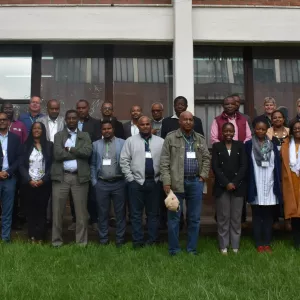Excellence in Agronomy Initiative commences in Africa
The Excellence in Agronomy for Sustainable Intensification and Climate Change Adaptation Initiative launched in east and southern Africa on July 28-29 in Addis Ababa, Ethiopia, at a workshop with panel discussions and ideation sessions to determine key actions for the project. The Initiative aims to deliver agronomic gain at scale for millions of smallholder farming households in prioritized farming systems,

Excellence in Agronomy Initiative commences in Africa
The Excellence in Agronomy for Sustainable Intensification and Climate Change Adaptation Initiative launched in east and southern Africa on July 28-29 in Addis Ababa, Ethiopia, at a workshop with panel discussions and ideation sessions to determine key actions for the project.
The Initiative aims to deliver agronomic gain at scale for millions of smallholder farming households in prioritized farming systems, with emphasis on supporting women and young farmers, to demonstrate measurable impact on food and nutrition security, income, water use, soil health and climate resilience.
Co-creation of agricultural solutions with farmers is integral to the Initiative through the engagement of modern tools, digital technologies, and behavioral science.
At the workshop, participants created a shared understanding of the Initiative’s goals for the region, laid groundwork for in-country planning and implementation, and increased visibility of the Initiative. Attendees agreed on the need to reevaluate beyond the boundaries of traditional agronomic practices and microeconomic challenges, considering policies at national and regional levels.

Combining expertise from across CGIAR research centers, private sector actors and government agriculture departments, the Initiative takes a data-based approach to offer demand-driven solutions. This was of particular appeal to Eyasu Elias, deputy minister at Ethiopia’s Ministry of Agriculture, who described the approach as “truly commendable” in comparison to conventional supply-driven approaches.
Elias, who was represented by a delegate at the event, highlighted Ethiopia’s current three priorities: managing acid soils; managing Vertisols so they utilize their natural productive potentials; and adopting practices that mitigate the formation of salt-affected soils.
“Attaining food security will be a tremendous challenge under current conditions,” explained Elias’ representative. “More than ever, we need innovative agronomic solutions that enhance nutrient use efficiencies; we need solutions that can be crafted from locally available alternatives. Collaborations that allow co-creation, co-design and participatory technology generation along these lines are appreciated from our end.”
Feature image: CGIAR researchers and partners outside the International Livestock Research Institute (ILRI) campus in Addis Ababa, Ethiopia, where the workshop took place. (Credit: Enawgaw Shibeshi/CIMMYT)

